RECENT EVENTS
The Anglican Tradition from a Postcolonial Perspective
With Kwok Pui-lan, Dean’s Professor of Systematic Theology
Candler School of Theology, Emory University
Thursday, February 1, 2024
Location: Online
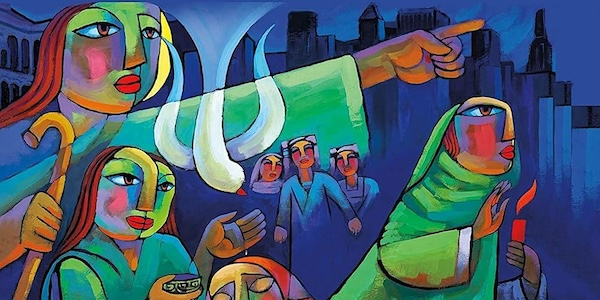
Professor Kwok Pui-lan’s most recent book, The Anglican Tradition from a Postcolonial Perspective (Seabury, 2023) focuses on voices in the global Anglican communion that challenge the colonialism, racism, and Eurocentrism of the dominant Anglican tradition. Her analysis points the way toward decolonization on a number of fronts, including economic justice, gender equality, human sexuality, women’s leadership, diversity in worship, and the mission of the church in a world of religious pluralism.
Professor Kwok was joined by a distinguished panel of theologians from several other global Christian traditions to discuss this book and its implications not just for the Anglican tradition, but for all churches of the world.
Moderator:
Mark D. Chapman is Professor of the History of Modern Theology and Vice Principal, Ripon College Cuddesdon; and Professor of the History of Modern Theology at the University of Oxford. Among is numerous publications is Anglicanism: A Very Short Introduction (2006). He is a long-time member of Ecclesiological Investigations International Research Network and is the editor of Pathways for Ecumenical and Interreligious Dialogue series with Palgrave Macmillan.
Panelists:
Kwok Pui-lan is Dean’s Professor of Systematic Theology and Special Advisor to the Dean for Strategic Changes at Candler School of Theology, Emory University. She previously served as the William F. Cole Professor of Christian Theology and Spirituality at Episcopal Divinity School, and has taught at the Chinese University of Hong Kong, Auburn Theological Seminary, Union Theological Seminary, and Yale Divinity School. She is the author or editor of over twenty books, including The Anglican Tradition from a Postcolonial Perspective, which is the subject of this panel.
Scott MacDougall is Associate Professor of Theology at Church Divinity School of the Pacific. He is the author of, among other publications, The Shape of Anglican Theology: Faith Seeking Wisdom, which was the subject of a previous webinar hosted by Graymoor Ecumenical and Interreligious Institute and Ecclesiological Investigations International Research Network.
Agnes M. Brazal is a professor in the Department of Theology and Religious Education at the De la Salle University, in Manilla. She is author of A Theology of Southeast Asia: Liberation-Postcolonial Ethics in the Philippines (2019), and a co-editor along with Cristina Lledo Gomez and Ma. Marilou S. Ibita of the forthcoming 500 Years of Christianity and the Global Filipino/a (Palgrave Macmillan, 2024).
Raimundo César Barreto, Jr., is Associate Professor of World Christianity at Princeton Theological Seminary. His research and teaching interests include the intersection between religion and society in Latin America, ecumenical and intercultural studies, decolonial thinking, and theory and methods in the study of world Christianity. He is currently working on a new book entitled Base Ecumenism: A Latin American Contribution to Ecumenical Praxis and Theology. His most recent publications include Protesting Poverty: Protestants, Social Ethics and the Poor in Brazil (Baylor University Press, 2023); the co-edited volumes Alterity and the Evasion of Justice in World Christianity (Fortress Press, 2023), edited with Deanna Womack; Decolonial Christianities: Latin American and Latinx Perspectives (Palgrave/McMillan, 2019), edited with Roberto Sirvent; and the forthcoming two volumes edited with Vladimir Latinovic, Decolonial Horizons (Palgrave, 2024). Barreto is also the editor of the Fortress Press series World Christianity and Public Religion, the co-editor of the Journal of World Christianity, and one of the conveners of the Princeton World Christianity Conference.
Ecumenical Service of the Word
2024 Week of Prayer for Christian Unity
Wednesday, January 24th, 2024, 12:00 PM Eastern
Interchurch Center Chapel
61 Claremont Avenue
New York, NY 10027
Or Online via YouTube: Watch Here

The 2024 theme for the Week of Prayer for Christian Unity is from Luke 10:27, in which Jesus summarizes the entire Law of the covenant with Israel, before illustrating the teaching with his parable of the Good Samaritan. The 2024 theme comes through the combined efforts of the Pontifical Dicastery for Promoting Christian Unity, the World Council of Churches and the Christian churches of Burkina Faso. Much of the coordination of this ecumenical project was done by the community of Chemin Neuf, a French Catholic and ecumenical community of vowed and lay people, particularly through their local community in Burkina Faso. The Very Rev. Patrick Malloy, Dean of the Episcopal Cathedral of St. John the Divine, preached at the Interchurch Center’s 2024 service where Chemin Neuf has recently established an intentional ecumenical community of young people living, working, and praying together (Community at the Crossing).
The Week of Prayer for Christian Unity was first observed in January, 1908. Known then as the Church Unity Octave, it was celebrated in the chapel of a small Atonement Franciscan Convent of the Protestant Episcopal Church, on a remote hillside fifty miles from New York City. This new prayer movement soon caught the imagination of others beyond the Franciscan Friars and Sisters of the Atonement, becoming an energetic movement that gradually blossomed into a worldwide observance involving many nations and millions of people.
A recording of service is available for viewing online.
Ecumenism in the Borderlands: Translating Worlds
2023 NAAE Annual Conference
November 16-17, 2023
San Antonio, Texas
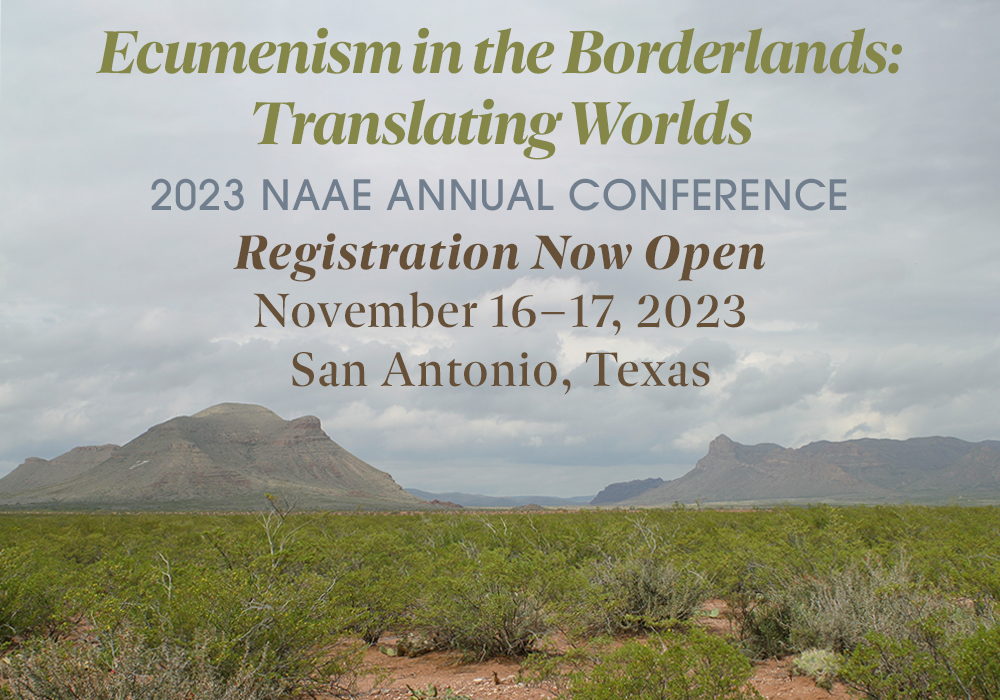
The 2023 annual conference of the North American Academy of Ecumenists, was held November 16-17, 2023, at St. Mary's University in San Antonio, TX (with an option for online participation via Zoom).
The conference examined ecumenism's role at the edges and borders of human divisions, encompassing language, culture, and other boundaries within ecclesial communities. Moreover, participants explored the transformation of key ecumenical concepts and movements when applied in diverse multilingual or intercultural contexts. Special attention was given to the US-Mexico border as a focal point for ecumenical inquiry and engagement.
Fifth Annual Paul Wattson Lecture
October 23rd, 2023, 8:00PM EDT (7:00PM CDT)
Catholic Theological Union
5416 South Cornell Avenue, Chicago, IL 60615

Probing our Ecumenical Journey with a Pan African, Women of Faith, Multigenerational Lens
The lecture will honour and probe the ancient and modern leadership of Pan African Women of Faith in the Christian movement of unity, justice, and mission in a forthcoming book by the lecturer. The lecture will focus on a multi-generational framework that rewrites the ecumenical narrative with the contributions of these hidden sheroes of the Christian faith from a Pan African lens. Such a presentation and discussion are timely for this season of a changing and changed landscape of Christianity’s rise and growth in Africa, the Caribbean, Latin America, and their diaspora communities in the global South and North.
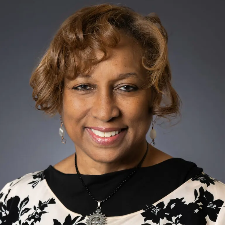 About the Presenter
About the Presenter
Rev. Dr. Angelique Walker-Smith will present the annual Paul Wattson Lecture, sponsored by the Franciscan Friars of the Atonement. Rev. Dr. Angelique Walker-Smith serves as the strategist for Pan-African, Orthodox and Ecumenical Faith Engagement at Bread for the World. She was recently elected to be one of the eight regional presidents of the World Council of Churches from North America in Karlsruhe, Germany. She has also served as ecumenical representative for the National Baptist Convention USA, Inc. She is the president of Historic Black Churches at Christian Churches Together (CCT) USA and has served in governance roles with the National Council of Churches. Walker-Smith has received leadership awards from Yale University Divinity School and Kent State University. In 2022, she was awarded the Figel Award for Ecumenism by the Washington Theological Consortium in Washington, D.C. Walker-Smith earned a doctorate degree from Princeton Theological Seminary and is former executive director/minister of the Church Council in Greater Indianapolis, Indiana and Church Council in Trenton, NJ.
About The Paul Wattson Lecture Series
This yearly lecture, sponsored by the Franciscan Friars of the Atonement and Catholic Theological Union, honors Graymoor founder, Servant of God Father Paul Wattson, SA, and focuses on ecumenical and interreligious dialogue and understanding as an important part of the mission to which Fr. Paul devoted his life.
A VISIT WITH THE ARCHBISHOP OF CANTERBURY
THE MOST REV. JUSTIN WELBY
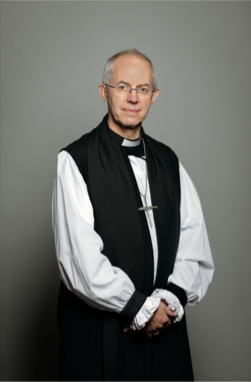
The Atonement Friars presented His Grace with the 14th Paul Wattson Christian Unity Award.
Saturday, September 23, 2023
Watch a Recording of the Award Ceremony
His Grace, Archbishop Justin Welby
The Most Rev. Justin Welby was installed as the 105th Archbishop of Canterbury in March 2013. Aside from being the successor to Saints Augustine and Thomas Becket, and fulfilling the role of Primate of All England, he is the spiritual leader of the Anglican Communion, which numbers 85 million throughout the world.
During Archbishop Justin’s sermon at his installation, he announced three personal priorities for his ministry: the renewal of prayer and religious life in the church, seeking reconciliation within the church, and encouraging every Christian to share their faith. In his ten years as archbishop he has borne ecumenical witness to the causes of the poor, for justice and peacemaking, and for ecological integrity. Earlier in 2023, he joined with Pope Francis and the Moderator of the Church of Scotland, the Very Rev. Dr. Iain Greenshields, on a mission of solidarity to South Sudan. In 2022, he granted an exclusive interview to Ecumenical Trends in the course of his participation in the World Council of Churches’ 11th General Assembly in Karlsruhe, Germany. His ecumenical presence and commitment have been consistently outstanding.
The Franciscan Friars of the Atonement recall with great fondness the visit to Graymoor of Archbishop Welby’s predecessor, the Most Rev. Michael Ramsey, a little over 50 years ago in 1972, when he became the fifth recipient of the Paul Wattson Christian Unity Award. We are now well pleased to bestow the Award on Archbishop Michael’s successor.
The Paul Wattson Christian Unity Award
The Paul Wattson Christian Unity Award is given only occasionally to those who have made significant contributions during their lives to the unity of the church. The Award is named for Fr. Paul Wattson, SA, Servant of God and Founder, along with Mother Lurana White, of the Society of the Atonement in 1898 at Graymoor. He is referred to as an “Apostle of Unity and Charity” by the Roman Catholic Church, due to both his and Mother Lurana’s pioneering vision of what they called “Christian reunion” or what the Church experiences today as the “ecumenical movement,” as well as ministering in mission to the poorest in society.
Both founders began their mission for At-One-Ment, or unity by way of reconciliation through Christ, at the end of the nineteenth century as high-church American Episcopalians. They, and a small community of sisters, friars, and lay associates were brought corporately into full communion with the Catholic Church by permission of Pope St. Pius X in 1909. They were commissioned to continue their work for unity among Christians. Before this, in 1908, Fr. Paul worked with the Rev. Spencer Jones of the Church of England to promote the annual observance of the Church Unity Octave, January 18-25. These eight days of prayer grew along with later observances to become the annual Week of Prayer for Christian Unity in 1968.
The Paul Wattson Christian Unity Award has been presented on thirteen different occasions: previous recipients include Rev. Charles Boyer, S.J. (1961); Lawrence Cardinal Sheehan and Msgr. Joseph Nelligan (1964); Augustin Cardinal Bea, S.J. (1965); Dr. Martin Marty (1969); Archbishop Michael Ramsey of Canterbury (1972); the Anglican-Roman Catholic International Commission (1974); Dr. Jaroslav Pelikan (1975); Pere Yves Congar, OP (1984); Jan Cardinal Willebrands (1987); Rev. John F. Hotchkins, S.T.D. and Prof. George A. Lindbeck (2000); the University of San Francisco (2004); the Pontifical Council (now Dicastery) for Promoting Christian Unity and Faith and Order Commission of the World Council of Churches (2008); and the Rev. Dr. John Ford, CSC (2014).
ECCLESIOLOGICAL INVESTIGATIONS PRESENTS:
Faith Seeking Wisdom: Scott MacDougall on the Shape of Anglican Theology
Monday, May 8, 2023, 12:00 PM - 2:00 PM ET (UTC-4)
Online via Zoom

In The Shape of Anglican Theology, Scott MacDougall examines what it is that makes Anglican theology Anglican. Beginning with a treatment of the ways in which Anglican theology is and is not distinct from other types of Christian theology, he describes the theological features that mark the general boundaries of Anglican theologizing before turning to consider a set of eight interconnected characteristics that provide Anglican theology with its distinctive profile. MacDougall argues that, by setting its boundaries as widely as possible and requiring subscription to specific theological propositions as little as possible, Anglican theology is in essence a wisdom theology that seeks to build the capacity for faithful Christian discernment in belief and practice.
Join MacDougall, along with a panel of three distinguished colleagues from both within and beyond the Anglican Communion, for a conversation about The Shape of Anglican Theology and its contribution to urgent ecclesiological and ecumenical questions in our time.
The Ecclesiological Investigations International Research Network seeks to promote studies, research, dialogue, and collaboration in ecclesiology across the broad spectrum of the Christian tradition. Therefore it exists to promote genuinely collaborative ecclesiology in national, international, intra-ecclesial, ecumenical, and inter-religious contexts.
Panel:
Dr. Scott MacDougall (Church Divinity School of the Pacific)
Rev. Dr. Katherine Sondregger (Virginia Theological Seminary)
Rev. Dr. Mark David Chapman (University of Oxford)
Bishop Emilio Alvarez (Asbury Theological Seminary)
This event is co-sponsored by the Ecclesiological Investigations International Research Network and Graymoor Ecumenical & Interreligious Institute.
2023 Week of Prayer for Christian Unity Ecumenical Service of the Word
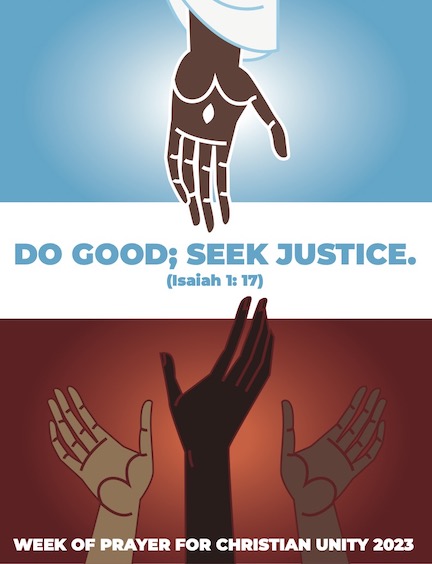 Wednesday, January 18th, 2023
Wednesday, January 18th, 2023
12:00 PM - 1:00 PM ET (GMT-5)
Location:
Interchurch Center Chapel
61 Claremont Avenue
New York, NY 10115
Or Online via YouTube: Watch Here
Please join the Franciscan Friars of the Atonement, Graymoor Ecumenical & Interreligious Institute, and the Interchurch Center Committee on Ecumenical, Interfaith, and Community Concerns for an Ecumenical Service of the Word (in person or online) in observation of the 2023 Week of Prayer for Christian Unity.
Free and open to the public; the service will remain available online for later viewing.
The 2023 theme for the Week of Prayer for Christian Unity is from Isaiah 1:17, in which the prophet exhorts his audience to “learn to do good; seek justice, rescue the oppressed, defend the orphan, plead for the widow.” The theme was developed with the assistance of a group of Christians in Minnesota, USA, convened by the Minnesota Council of Churches. Minneapolis, MN became a flashpoint for calls for racial justice and equity during the responses of communities to the murder of George Floyd, which received world-wide attention. Preaching at the Interchurch Center's 2023 service will be the Rev. Dr. David Latimore, Director of the Betsey Stockton Center for Black Church Studies at Princeton Theological Seminary.
The Week of Prayer for Christian Unity was first observed in January, 1908. Known then as the Church Unity Octave, it was celebrated in the chapel of a small Atonement Franciscan Convent of the Protestant Episcopal Church, on a remote hillside fifty miles from New York City. This new prayer movement soon caught the imagination of others beyond the Franciscan Friars and Sisters of the Atonement, becoming an energetic movement that gradually blossomed into a worldwide observance involving many nations and millions of people.
Christian Nationalism in International Perspective: Lessons and Legacies
December 12, 2022, 12:00 PM - 2:00 PM EST
A webinar with distinguished experts on the history of Christian nationalism, discussing parallels and contrasts across national borders.

Although the entanglement of religious institutions with political agendas is as old as civilization, the modern world and its dominant political configuration, the nation-state, have engendered ideological frameworks that invite religious communities to seek and wield political power on behalf of an ethnoreligious faction framed as the sole authentic representative of national identity and destiny. In particular, Christian nationalism (by no means the only religious nationalism of importance today, but the framework that exerts the greatest pressure on contemporary American and European life) incentivizes efforts to overturn democratic civil norms in favor of government-imposed sectarian values, punishing those who do not capitulate with imprisonment, expulsion, or military/paramilitary violence.
One hundred years ago, in 1922, the end of the Greco-Turkish War entailed population exchanges between the antagonistic nations, resulting in religiously exclusive ethnostates whose national consciousness remained (in the case of Greece) or later became (in the case of Turkey) intensely affiliated with religious identity. In the same year, the conclusion of the Irish War of Independence gave way to dashed hopes and civil war, subsequently descending into decades of sectarian paramilitary violence in the contestation of rival Christian-coded nationalisms (including the Bloody Sunday attacks in 1972). And today, in 2022, Ukraine is living the devastation of a brutal neo-imperialist war justified in part by (and likely to intensify) Christian nationalistic ideology, while the United States of America is reckoning with a surging Christian nationalist movement that has embraced insurrectionist violence and has seized the levers of judiciary power.
This colloquium brings together distinguished experts in Christian nationalism from these four distinct denominational and national contexts, for a conversation that will pose questions across these contexts with the aim of illuminating continuities, divergences, and strategies for Christian ethical, political, and theological sense-making in response to (and recognizing the complex moral terrain of) nationalistic culture and ideology in the churches.
Speakers:
 Prof. Pamela Cooper-White is the Christiane Brooks Johnson Professor of Psychology and Religion and former Dean and Vice President for Academic Affairs, at Union Theological Seminary, New York. She also serves as Assisting Priest at the Episcopal Cathedral of St. John the Divine in New York City. An award-winning author, she has published 10 books, including The Cry of Tamar: Violence against Women and the Church's Response (in 2 ed.); Shared Wisdom: Use of the Self in Pastoral Care & Counseling; and Many Voices: Pastoral Psychotherapy in Relational and Theological Perspective. Her latest book is The Psychology of Christian Nationalism: How People Are Drawn in and How to Talk Across the Divide (Fortress Press, 2022). She is an Academic Member of the American Psychoanalytic Association and serves as President of the International Association for Spiritual Care in Switzerland; on the Board of the Freud Foundation U.S. (Freud Museum Vienna); the editorial Board of the Journal of Pastoral Theology; and the Steering Committee of the Psychology, Culture, and Religion Group of the American Academy of Religion.
Prof. Pamela Cooper-White is the Christiane Brooks Johnson Professor of Psychology and Religion and former Dean and Vice President for Academic Affairs, at Union Theological Seminary, New York. She also serves as Assisting Priest at the Episcopal Cathedral of St. John the Divine in New York City. An award-winning author, she has published 10 books, including The Cry of Tamar: Violence against Women and the Church's Response (in 2 ed.); Shared Wisdom: Use of the Self in Pastoral Care & Counseling; and Many Voices: Pastoral Psychotherapy in Relational and Theological Perspective. Her latest book is The Psychology of Christian Nationalism: How People Are Drawn in and How to Talk Across the Divide (Fortress Press, 2022). She is an Academic Member of the American Psychoanalytic Association and serves as President of the International Association for Spiritual Care in Switzerland; on the Board of the Freud Foundation U.S. (Freud Museum Vienna); the editorial Board of the Journal of Pastoral Theology; and the Steering Committee of the Psychology, Culture, and Religion Group of the American Academy of Religion.
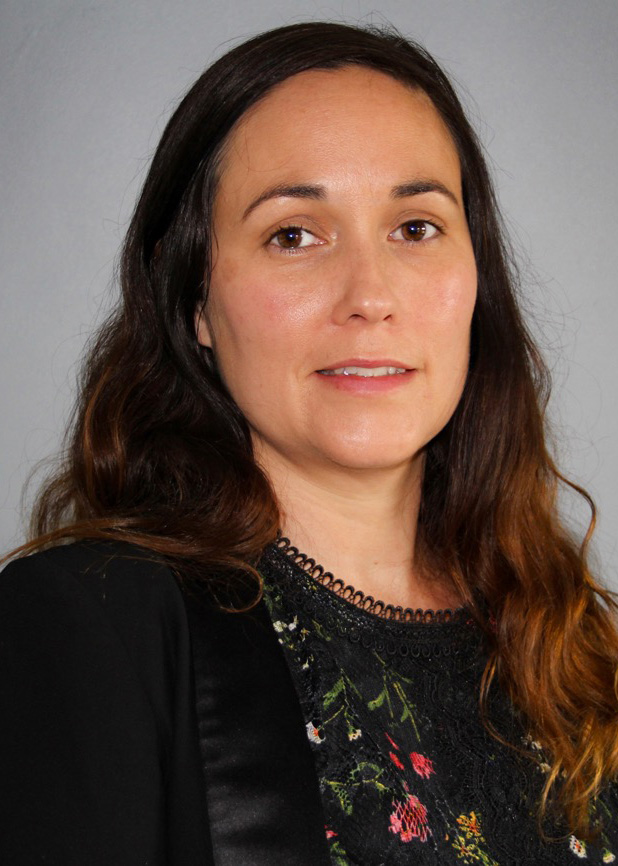 Dr. Nicola Brady is General Secretary of Churches Together in Britain and Ireland (CTBI). Her previous roles include General Secretary of the Irish Council of Churches (2016-2021) and Research Coordinator for the Council for Justice and Peace of the Irish Catholic Bishops’ Conference. She has particular experience in the area of faith-based peace-building on the island of Ireland and internationally, including human rights advocacy, support to victims/survivors, facilitation of civic dialogue, community engagement with policing, and research across a broad range of issues relevant to reconciliation. She is a Director of Christian Aid Ireland and the Maximilian Kolbe Foundation, which works to extend the lessons of German-Polish reconciliation post-World War II to other conflict areas. She is currently Chair of the Steering Committee for the National Synodal Pathway of the Catholic Church in Ireland.
Dr. Nicola Brady is General Secretary of Churches Together in Britain and Ireland (CTBI). Her previous roles include General Secretary of the Irish Council of Churches (2016-2021) and Research Coordinator for the Council for Justice and Peace of the Irish Catholic Bishops’ Conference. She has particular experience in the area of faith-based peace-building on the island of Ireland and internationally, including human rights advocacy, support to victims/survivors, facilitation of civic dialogue, community engagement with policing, and research across a broad range of issues relevant to reconciliation. She is a Director of Christian Aid Ireland and the Maximilian Kolbe Foundation, which works to extend the lessons of German-Polish reconciliation post-World War II to other conflict areas. She is currently Chair of the Steering Committee for the National Synodal Pathway of the Catholic Church in Ireland.
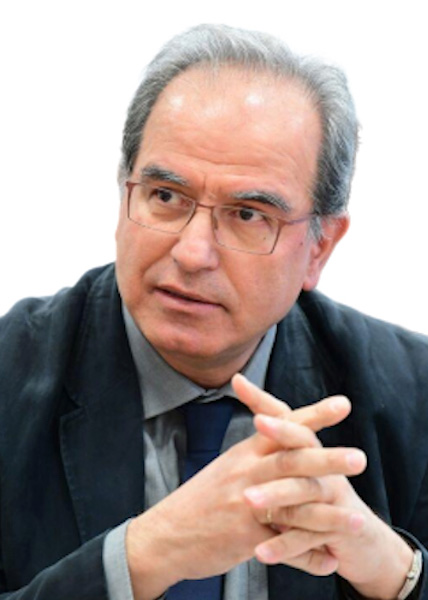 Prof. Pantelis Kalaitzidis is Director of the Volos Academy for Theological Studies, a research center dealing with contemporary issues for Eastern Orthodoxy. He has taught systematic theology at the Hellenic Open University, and at St Sergius Institute of Orthodox Theology in Paris (as Visiting Professor). His publications include, among others, the books Orthodoxy and Modernity: An Introduction (Athens: Indiktos Publications, 2007) [in Greek]; Orthodoxy and Political Theology (Geneva: WCC Publications, 2012); and Orthodox Handbook on Ecumenism: Resources for Theological Education (Oxford/Geneva/Volos: Regnum Books International/WCC Publications/Volos Academy Publications, 2014). He has been a Research Fellow at Holy Cross Greek Orthodox School of Theology, Princeton Theological Seminary, Princeton University, DePaul University, and KU Leuven. Dr. Kalaitzidis is a member of the Executive Committee of the European Academy of Religion, and in addition to his membership to the International Association of Orthodox Dogmatic Theologians (IAODT), he is also Chair (with Prof. Aristotle Papanikolaou) of the Political Theology Group of the International Orthodox Theological Association (IOTA).
Prof. Pantelis Kalaitzidis is Director of the Volos Academy for Theological Studies, a research center dealing with contemporary issues for Eastern Orthodoxy. He has taught systematic theology at the Hellenic Open University, and at St Sergius Institute of Orthodox Theology in Paris (as Visiting Professor). His publications include, among others, the books Orthodoxy and Modernity: An Introduction (Athens: Indiktos Publications, 2007) [in Greek]; Orthodoxy and Political Theology (Geneva: WCC Publications, 2012); and Orthodox Handbook on Ecumenism: Resources for Theological Education (Oxford/Geneva/Volos: Regnum Books International/WCC Publications/Volos Academy Publications, 2014). He has been a Research Fellow at Holy Cross Greek Orthodox School of Theology, Princeton Theological Seminary, Princeton University, DePaul University, and KU Leuven. Dr. Kalaitzidis is a member of the Executive Committee of the European Academy of Religion, and in addition to his membership to the International Association of Orthodox Dogmatic Theologians (IAODT), he is also Chair (with Prof. Aristotle Papanikolaou) of the Political Theology Group of the International Orthodox Theological Association (IOTA).
 Archimandrite Cyril Hovorun is a Professor in Ecclesiology, International Relations and Ecumenism at the Sankt Ignatios College, University College Stockholm. A graduate of the Theological Academy in Kyiv and National University in Athens, he accomplished his doctoral studies at Durham University under the supervision of Fr Andrew Louth. He was a chairman of the Department for External Church Relations of the Ukrainian Orthodox Church, first deputy chairman of the Educational Committee of the Russian Orthodox Church, and later research fellow at Yale and Columbia Universities, visiting professor at the University of Münster in Germany, director of the Huffington Ecumenical Institute at Loyola Marymount University in Los Angeles and Assistant Professor at the same university. He is an international fellow at Chester Ronning Centre for the Study of Religion and Public Life at the University of Alberta in Canada and an invited professor at the Pontifical Gregorian University in Rome.
Archimandrite Cyril Hovorun is a Professor in Ecclesiology, International Relations and Ecumenism at the Sankt Ignatios College, University College Stockholm. A graduate of the Theological Academy in Kyiv and National University in Athens, he accomplished his doctoral studies at Durham University under the supervision of Fr Andrew Louth. He was a chairman of the Department for External Church Relations of the Ukrainian Orthodox Church, first deputy chairman of the Educational Committee of the Russian Orthodox Church, and later research fellow at Yale and Columbia Universities, visiting professor at the University of Münster in Germany, director of the Huffington Ecumenical Institute at Loyola Marymount University in Los Angeles and Assistant Professor at the same university. He is an international fellow at Chester Ronning Centre for the Study of Religion and Public Life at the University of Alberta in Canada and an invited professor at the Pontifical Gregorian University in Rome.
North American Academy of Ecumenists
2022 Annual Meetings
October 7-9, 2022
Cathedral of St. John the Divine
New York City, NY
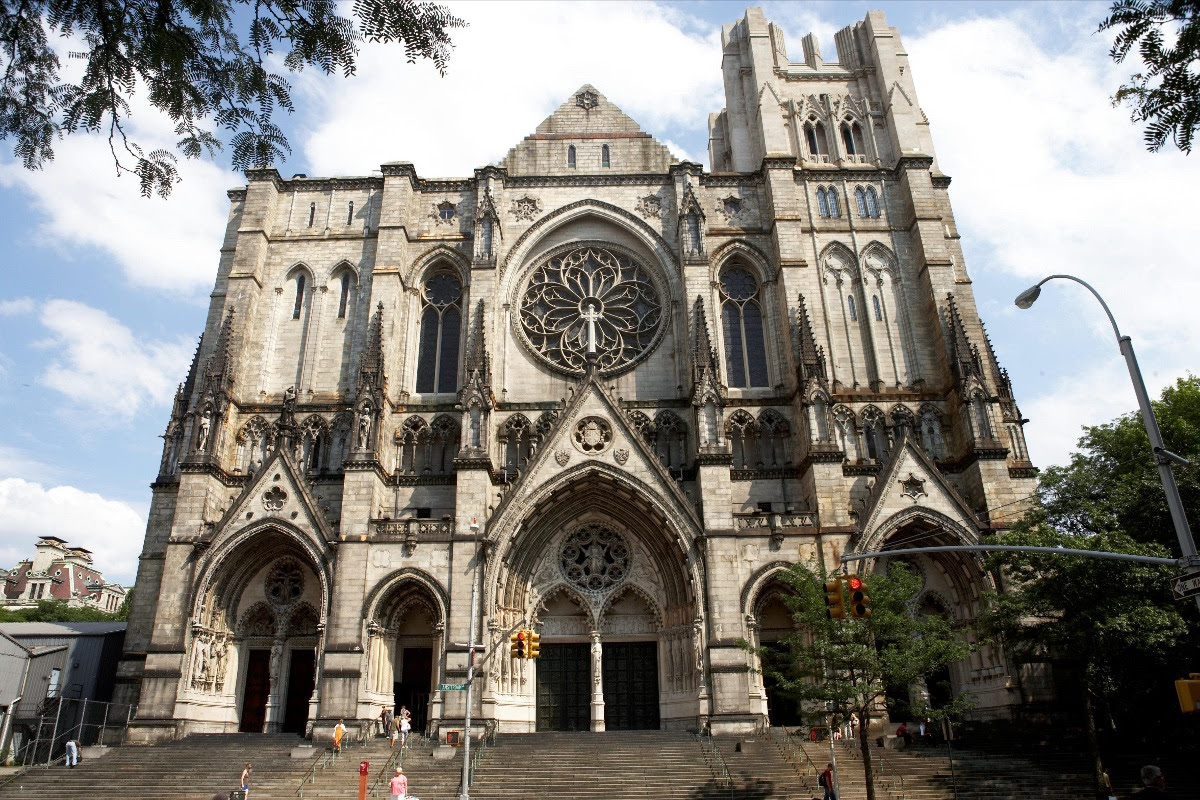
The 2022 Annual Meeting of the North American Academy of Ecumenists was held on October 7-9, 2022, at the Episcopal Cathedral of St. John the Divine in New York City. The conference was conducted in a hybrid mode, with an in-person gathering combined with an option for remote attendance via Zoom.
The theme for this year's conference was "Ecumenism and Asceticism":
It has not always been appreciated over the past decades of rapprochement between formerly antagonistic ecclesial communities that lasting peace cannot simply begin with dialogue or strategizing for the future of a relationship: it must begin with spiritual work and transformation within the communities that would take steps to reconcile. Peace and conflict research has made clear that identities and relationships alike accrue damage from histories of antagonism and the traumas of past violence, which cannot simply be set aside through formal accords as though they did not continue to constrain the available mentalities, emotional conditions, and very self-understanding of communities in the present. Painstaking ecumenical formation (which includes the uprooting of corrupt attitudes toward otherness and the weeds of rancor sown by history) therefore has to precede productive ecumenical engagement – even as guided and strategic encounter is doubtless crucial to ecumenical formation.
The 2022 annual meeting of the North American Academy of Ecumenists, therefore, will engage questions about the role of asceticism, broadly construed, in ecumenical affairs, for instance: formation for ecumenical engagement, ecumenical spirituality and liturgy, prayer practice as fuel for ecumenical compassion and attunement, virtue ethics and the theological anthropology of ecumenical engagement, the ways that closed or captive epistemologies foreclose on the possibility of authentic ecumenical understanding, the sins/passions/demons that exacerbate or incentivize corroded relationships and the ascetic traditions that confront such forces, monastic settings as venues for ecumenism or as training grounds for ecumenical virtue and praxis, and historical voices from the ascetic tradition that offer insights for contemporary ecumenical challenges.
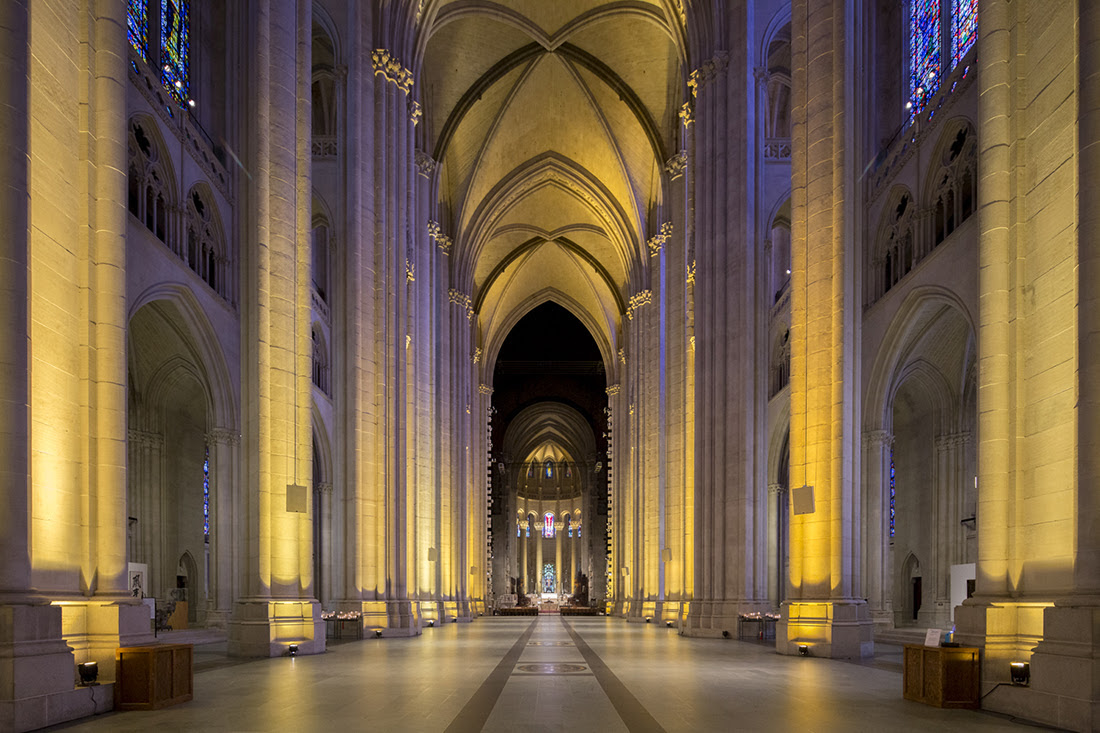
PROGRAM SCHEDULE
Friday, October 7
2:00 pm - On-site registration
3:00 pm - Informal tour of the Cathedral
4:00 pm - Opening worship & welcome from NAAE and Cathedral leadership
5:00 pm - NAAE Presidential Address & annual membership meeting
6:00 pm - Wine & cheese reception
Saturday, October 8
9:00 am - Morning prayer in the Cathedral
9:30 am - Continental breakfast & coffee
10:00 am - Session 1: Asceticism in Contemporary Ecumenism
11:30 am - Break for lunch in Morningside Heights
2:00 pm - Session 2: Liturgy, Spirituality, and Formation
3:30 pm - Coffee break
4:00 pm - Session 3: Asceticism and Ecumenism: Voices from the Tradition
6:00 pm - Evening prayer in the Cathedral
6:30 pm - Banquet dinner for participants at V&T Pizzeria
Sunday, October 9
9:00 am - Panel & conversation featuring local ecumenical initiatives
10:30 am - Holy Eucharist at the Cathedral - all are welcome
12:00 pm - Final reflections & closing of conference
Fourth Annual Paul Wattson Lecture with Archbishop Donald J. Bolen
October 10th, 2022, 7-9PM.
The James and Catherine Denny Center at Catholic Theological Union
5416 South Cornell Avenue, Chicago

His Eminence Archbishop Donald J. Bolen, Diocese of Regina, presented the Intersection Between Ecumenism and Justice at the annual Paul Wattson Lecture, sponsored by the Friars of the Atonement.
This yearly lecture, sponsored by the Franciscan Friars of the Atonement and Catholic Theological Union, honored the founder of the Friars, Fr. Paul Wattson, and focused on ecumenical and interreligious dialogue and understanding as an important part of the mission to which Fr. Paul devoted his life.

Archbishop Donald J. Bolen was born on the Canadian prairies and studied in Regina, Ottawa and Oxford. After ordination, he taught in the Religious Studies department at Campion College at the University of Regina. In 2001, he was appointed to work at the Vatican’s Pontifical Council for Promoting Christian Unity, where he served in international dialogues with Anglicans and Methodists. He was named the Bishop of the Diocese of Saskatoon in 2010 and the Archbishop of Regina in 2016. He is active in ecumenical work, justice work, and Indigenous relations, responding to the Calls to Action of the Truth and Reconciliation Commission.
Decolonizing Churches: Ecclesiological Investigations International Research Network's 14th International Conference
June 22-25, 2022
San Juan, Puerto Rico
Paper proposal deadline: March 30, 2022
Free and open to the public.
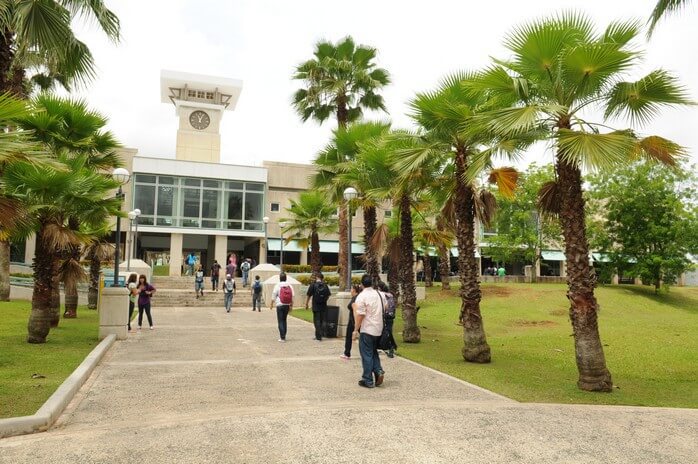
Graymoor Ecumenical & Interreligious Institute is one of five co-sponsors for the 14th international conference of the Ecclesiological Investigations Network, " Decolonizing Churches." We invite proposals for papers addressing decolonizing churches and theology in the Caribbean, Latin America, and their diaspora. We also welcome papers dealing with colonization in other global contexts. Closely related to decolonizing theologies are topics addressing oppressions based on gender, racial, and ethnic identities; economic inequality; social vulnerabilities; climate change and global challenges such as pandemics, neoliberalism, and the role of information technology in modern society, for which proposals are also welcomed. As Ecclesiological Investigations seeks to foster interdisciplinary and transdisciplinary scholarship, we invite proposals for papers from historical, dogmatic, social scientific, and practical disciplines. Fostering an open ecumenism, we welcome proposals for papers reflecting all branches of Christian tradition. Proposals for papers that deal with specific case studies are welcomed, as are those that deal with comparative ecclesiologies or theologies. Finally, we welcome proposals for papers that deal with decolonization in interfaith or pluralistic contexts. To submit a paper proposal or to register, visit https://sanjuan2022.ei-research.net.
Additionally, GEII is offering up to five Graymoor Scholarships for early-career scholars or students in need of financial support to attend the conference. Each scholarship fully covers conference fees and accommodation; recipients will participate in an informal meeting about the present and future of ecumenics, hosted by GEII on site in San Juan, and will be encouraged to publish their papers as a set in Ecumenical Trends. The application process for the Graymoor Scholarships is integrated into the paper proposal system. Priority will be given to those scholars whose accepted paper proposals concern explicitly ecumenical or interreligious topics. Questions about the scholarships can be directed to GEII Associate Director, Aaron Hollander, at ahollander@geii.org
Inaugural cohort of Graymoor Scholars:
With the "Decolonizing Churches" conference in San Juan, GEII is convening its first-ever cohort of Graymoor Scholars: an inspiring group of doctoral students in theology, ecclesiology, ethics, and history of Christianity, who will meet for discussion and present original research in San Juan, publish their work in Ecumenical Trends, and consult with the Graymoor Institute on the shape and future of ecumenical conversations in the institutions of theological education. We are delighted to introduce here our six inaugural scholars:
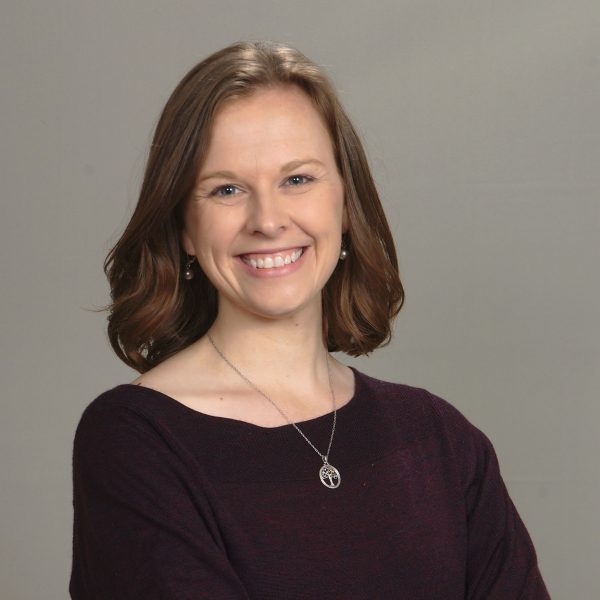 Britta Meiers Carlson is a PhD student at the Boston University School of Theology. Her work reflects on interactions between historically white Christian churches and Latin American immigrant communities to better understand how ecclesiology is evolving in the United States. Supporting areas of research include postcolonial and liberation theologies, race studies, and church history. Britta is an ordained pastor in the Evangelical Lutheran Church in America.
Britta Meiers Carlson is a PhD student at the Boston University School of Theology. Her work reflects on interactions between historically white Christian churches and Latin American immigrant communities to better understand how ecclesiology is evolving in the United States. Supporting areas of research include postcolonial and liberation theologies, race studies, and church history. Britta is an ordained pastor in the Evangelical Lutheran Church in America.
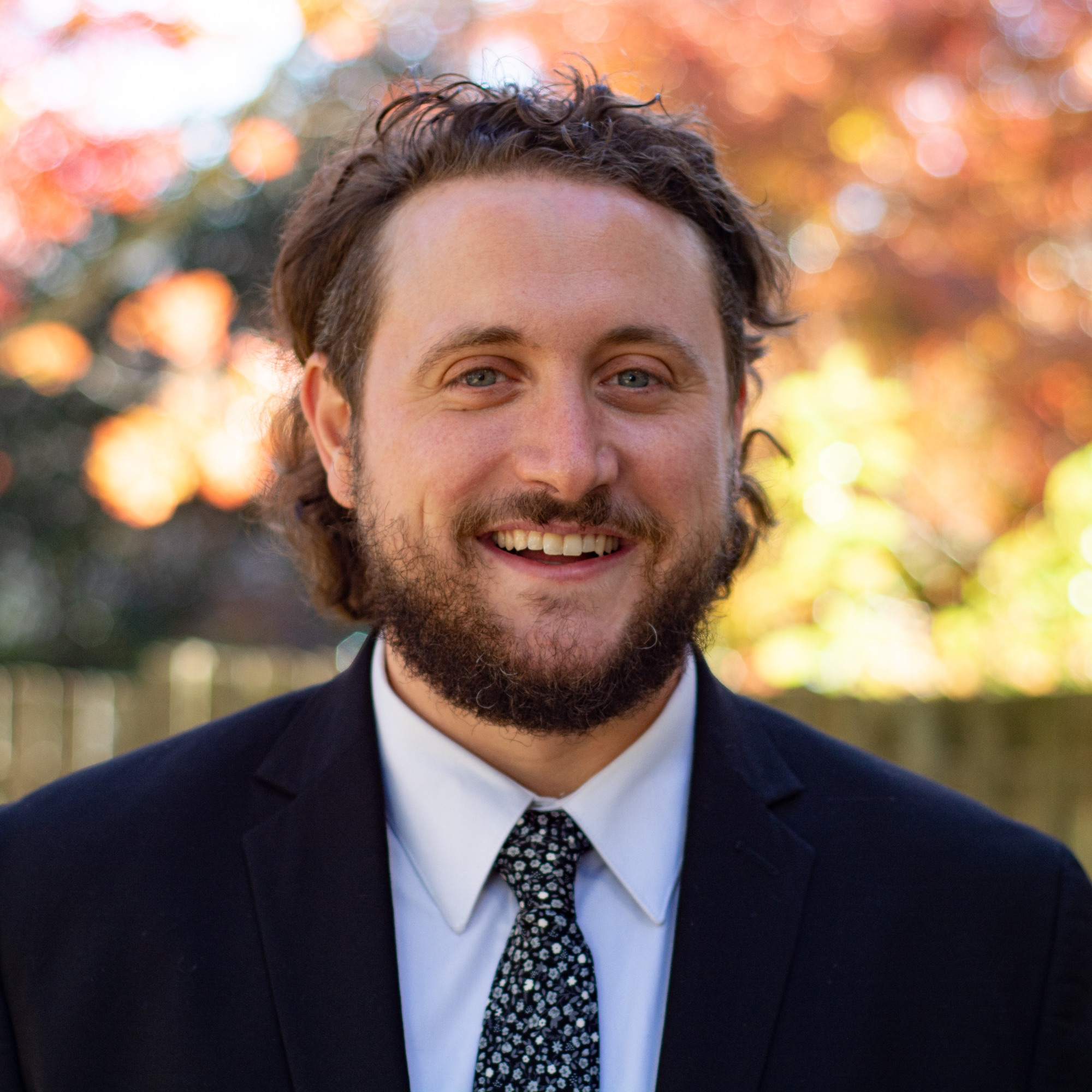 Stephen R. Di Trolio Coakley is a PhD student in the Department of History and Ecumenics at Princeton Theological Seminary. Stephen was born in Costa Rica and grew up in Argentina, where he returned to live after college in the United States. In Buenos Aires, he was a youth worker with international students, taught at a local seminary, and worked alongside rural education projects in Nicaragua before coming to Princeton. His research interests include Latin American political history, Pentecostalism in Argentina, social movements, political theology, and decolonial theory. He holds a BA in Theological Studies from the University of Valley Forge, has completed coursework in the Sociology of Culture program in the Instituto de Altos Estudios Sociales at the Universidad Nacional de San Martín, and received his MDiv from Princeton Theological Seminary.
Stephen R. Di Trolio Coakley is a PhD student in the Department of History and Ecumenics at Princeton Theological Seminary. Stephen was born in Costa Rica and grew up in Argentina, where he returned to live after college in the United States. In Buenos Aires, he was a youth worker with international students, taught at a local seminary, and worked alongside rural education projects in Nicaragua before coming to Princeton. His research interests include Latin American political history, Pentecostalism in Argentina, social movements, political theology, and decolonial theory. He holds a BA in Theological Studies from the University of Valley Forge, has completed coursework in the Sociology of Culture program in the Instituto de Altos Estudios Sociales at the Universidad Nacional de San Martín, and received his MDiv from Princeton Theological Seminary.
Yenny Delgado is a psychologist and public theologian.  She has worked with social movements and local churches for over a decade, advocating for improved equality education and ending racism in the Church. She is a ruling elder in the Presbyterian Church, member of Ñawi intercultural dialogue, and founder of PUBLICA Theology and Mujeres Doing Theology in Abya Yala. Currently, she is a PhD student in Social Science of Religion at the University of Lausanne.
She has worked with social movements and local churches for over a decade, advocating for improved equality education and ending racism in the Church. She is a ruling elder in the Presbyterian Church, member of Ñawi intercultural dialogue, and founder of PUBLICA Theology and Mujeres Doing Theology in Abya Yala. Currently, she is a PhD student in Social Science of Religion at the University of Lausanne.
Ryan Ramsey is a PhD student at Baylor University. 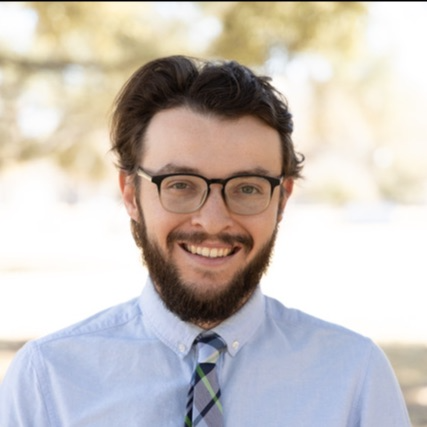 He holds a Master of Arts in Religion from Yale Divinity School (’19) and a BA from Lee University (’14). His dissertation compares Latin American and African charismatic lay leaders in the late 19th and early 20th centuries, focusing especially on relationships between Christianity and indigenous religions.
He holds a Master of Arts in Religion from Yale Divinity School (’19) and a BA from Lee University (’14). His dissertation compares Latin American and African charismatic lay leaders in the late 19th and early 20th centuries, focusing especially on relationships between Christianity and indigenous religions.
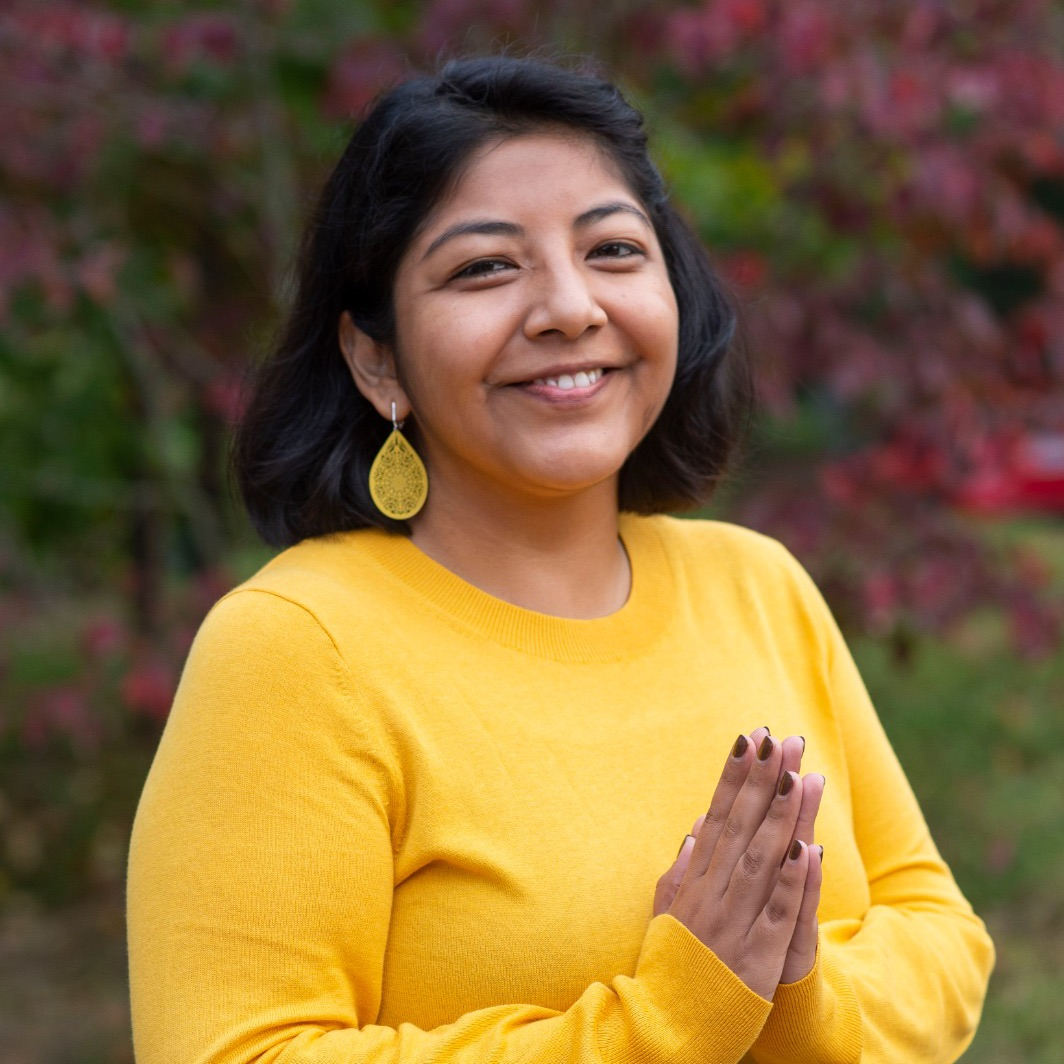 Kenia Vanessa Rodriguez is a Latina (Bolivian) decolonial feminist PhD student in Christian Social Ethics at Drew Theological School. She focuses on decolonizing the theory and practice of the U.S. Protestant Church using a mujerista critique to envision a shared future. Kenia Vanessa obtained a Masters in Divinity degree from the Wesley Theological Seminary and prior to seminary was a practicing immigration law attorney in the D.C. area.
Kenia Vanessa Rodriguez is a Latina (Bolivian) decolonial feminist PhD student in Christian Social Ethics at Drew Theological School. She focuses on decolonizing the theory and practice of the U.S. Protestant Church using a mujerista critique to envision a shared future. Kenia Vanessa obtained a Masters in Divinity degree from the Wesley Theological Seminary and prior to seminary was a practicing immigration law attorney in the D.C. area.
 Hesron Sihombing, an Indonesian native, is a PhD student at the University of Denver/Iliff School of Theology where he studies theology and ethics. His current work examines the process of decolonizing churches by decolonizing the history of mission from an Indonesian-Lutheran perspective.
Hesron Sihombing, an Indonesian native, is a PhD student at the University of Denver/Iliff School of Theology where he studies theology and ethics. His current work examines the process of decolonizing churches by decolonizing the history of mission from an Indonesian-Lutheran perspective.
WEEK OF PRAYER FOR CHRISTIAN UNITY – ECUMENICAL SERVICE
Wednesday, January 19th, 2022
12:00 PM Eastern (GMT-5)
Free and open to the public.
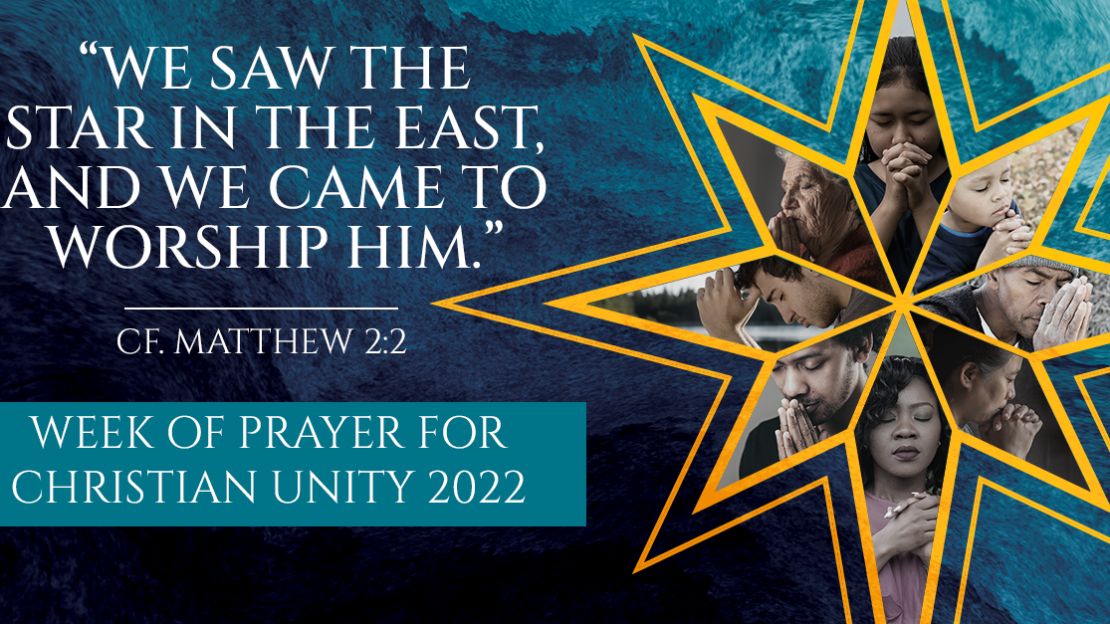
Please join the Franciscan Friars of the Atonement, Graymoor Ecumenical & Interreligious Institute, and the Interchurch Center Committee on Ecumenical, Interfaith, and Community Concerns, for a live-streamed Ecumenical Service of the Word in observation of the 2022 Week of Prayer for Christian Unity.
The 2022 theme for the Week of Prayer for Christian Unity was developed by the Middle East Council of Churches based in Beirut, Lebanon, and it refers to Matthew 2:2 – We saw the star in the east, and we came to worship him. Today, more than ever, the Middle East needs a heavenly light to accompany its people. The star of Bethlehem is a sign that God walks with his people, feels their pain, hears their cries, and shows them compassion. It reassures us that though circumstances change and terrible disasters may happen, God’s faithfulness is unfailing. The Lord neither slumbers nor sleeps. He walks beside his people and brings them back when they are lost or in danger. The journey of faith is this walking with God who always watches over his people and who guides us in the complex paths of history and life.
For this Week of Prayer, the Christians of the Middle East chose the theme of the star that rose in the east for a number of reasons. While many Western Christians celebrate Christmas, the more ancient feast, and still the principal feast of many Eastern Christians, is the Epiphany when God’s salvation is revealed to the nations in Bethlehem and at the Jordan. This focus on the theophany (the manifestation) is, in a sense, a treasure which Christians of the Middle East can offer to their brothers and sisters around the world.
The Week of Prayer for Christian Unity was first observed in January, 1908. Known then as the Church Unity Octave, it was celebrated in the chapel of a small Atonement Franciscan Convent of the Protestant Episcopal Church, on a remote hillside fifty miles from New York City. This new prayer movement soon caught the imagination of others beyond the Franciscan Friars and Sisters of the Atonement, becoming an energetic movement that gradually blossomed into a worldwide observance involving many nations and millions of people.
God’s Terrible Springtime? Ecumenical Purpose and Opportunity in Times of Upheaval
Wednesday, October 20, 2021
1:00-2:30 EDT (GMT -4)
Free and open to the public.

In April of 1944, one of the pioneering American ecumenical theorists, John Mackay, wrote in the inaugural issue of Theology Today that his moment – at the height of World War II and the horrors of the Holocaust – might indeed prove to be "one of God’s springtimes, albeit one of His terrible springtimes." Pointing to revolutionary changes not only on the political stage but also in education, economics, and indeed in the churches and in relations between the churches, Mackay called on the readers of the fledgling journal to attend not only to the tremendous crises at hand but also to the opportunity for "house-cleaning" that would accompany the storms and stress of their time.
Our own time – in the midst of a global pandemic, wracked by spasms of cultural and political antagonism, and facing scarcely imaginable upheavals of economic and ecological disorder – looks increasingly to be another such "terrible springtime." And the ecumenical movement, or what is left of it, must again reckon with its purpose and possibilities in such a context. The period following World War II saw the emergence of the World Council of Churches and the convocation of the Second Vatican Council, inspiring us to wonder what novel ecumenical modalities and methodologies will emerge for the mid-twenty-first century.
This webinar poses the questions: Without presupposing the shape they will take, in what new ways might ecumenism – both between and within religious communities – best serve the world in our time of economic, cultural, political, and ecological upheaval? What might be the role, and what are the opportunities and pitfalls, of a vision of unity and reconciliation that is mistrusted on either extreme of the political/ethical spectrum that dominates American (indeed Western more generally) civil discourse and imagination today?
Panelists:
 Rev. Dr. Dale Irvin:
Rev. Dr. Dale Irvin:
(Founding Faculty Member, New School of Biblical Theology; Adjunct Professor of Theology and Religious Studies, Georgetown University; Chair, Ecclesiological Investigations International Research Network)
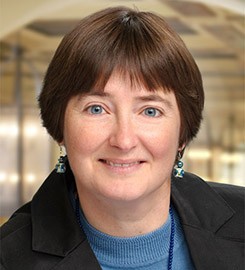 Dr. Mary Doak:
Dr. Mary Doak:
(Professor of Theology and Religious Studies, University of San Diego)
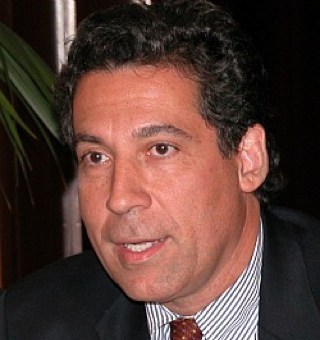 Dr. Tony Kireopoulos:
Dr. Tony Kireopoulos:
(Associate General Secretary for Faith & Order and Interfaith Relations, National Council of Churches USA)
Responding to the Call of "A Joint Message for the Protection of Creation"
Friday, October 22, 2021
4:00 to 5:30 pm EDT (GMT -4)

Presented by:
Berkley Center at Georgetown University
Department of Theology and Religious Studies, Georgetown University
Ecclesiological Investigations International Research Network
Graymoor Ecumenical & Interreligious Institute
... we call on everyone, whatever their belief or worldview, to endeavour to listen to the cry of the earth and of people who are poor, examining their behaviour and pledging meaningful sacrifices for the sake of the earth which God has given us.
– from "A Joint Message for the Protection of Creation"
On September 1, 2021, Pope Francis, Ecumenical Patriarch Bartholomew I, and Archbishop Justin of Canterbury issued "A Joint Message for the Protection of Creation," calling on the world to address the current crisis of global climate change. The message was issued at the beginning of the 2021 Season of Creation and in advance of the UN Climate Change Conference set to gather in Glasgow, Scotland, in November. Join us for a webinar on October 22, 2021, from 4:00 to 5:30 pm (Eastern Time USA) as a panel of scholars explore the significance and implications of "A Message" for the churches and for the world.
Panelists:
José Casanova:
(Senior Fellow, The Berkley Center and Professor Emeritus, Georgetown University)
John Chryssavgis:
(Archdeacon of the Ecumenical Patriarchate)
Elaine Padilla:
(Associate Professor of Philosophy and Religion/Latinx and Latin American Studies, University of La Verne)
Peter C. Phan:
(Ignacio Ellacuría Chair of Catholic Social Thought, Georgetown University; Faculty Fellow, Berkley Center)
Anne Marie Reijnen:
(Professor of Systematic Theology, La Faculté Universitaire de Théologie Protestante de Bruxelles and Theologicum of the Institut Catholique de Paris)
Moderated by Brian Flanagan:
(Associate Professor of Theology and Religious Studies, Marymount University; President, College Theology Society)
On the Listening Road: Reflections on Syrian and Iraqi Refugees and the Power of Stories
Monday, November 1, 2021
12:00 pm - 1:30 pm EDT (GMT -4)
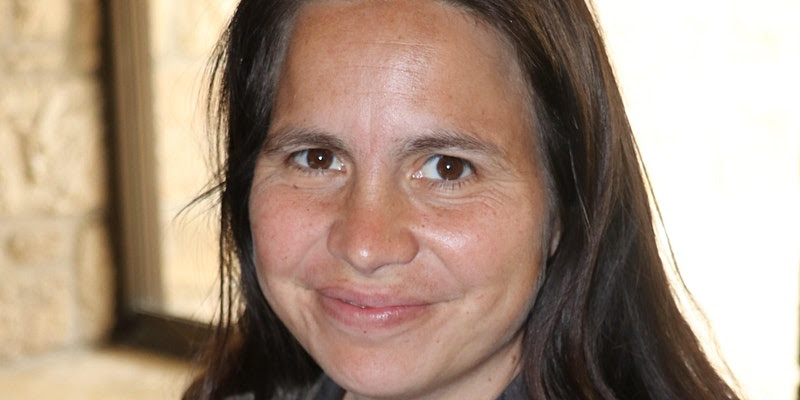
Stephanie Saldaña, 2021 Paul Wattson Lecture honoree, Atlantic School of Theology, Halifax, Canada
Stephanie Saldaña is a writer, teacher and journalist who specializes in religious diversity in the Middle East, with a focus on refugees. She first traveled to the region over twenty years ago on a Thomas Watson fellowship, where she became fascinated by conversations between local Christians and Muslims. After starting her career as a journalist at the Lebanon Daily Star in Beirut, she returned to the United States to pursue a Masters in Theological Studies at Harvard Divinity School, where she focused on Muslim-Christian dialogue and Arabic. In 2004, she moved to Syria on a Fulbright Islamic Civilizations Initiative Grant to study the Prophet Jesus in Islam. Her year there became the basis of her first book, The Bread of Angels. In 2006 she moved to Jerusalem, where she has lived for thirteen years. She taught Palestinian students at Al-Quds Bard College, and her articles and essays have appeared in The New York Times, The Wall Street Journal, Plough, America, the Jesuit Review and other publications. In 2016, as an Abraham Path Fellow, she launched The Mosaic Stories to tell the stories of disappearing cultural heritage in the Middle East, particularly among refugees fleeing Iraq and Syria. Her second book, A Country Between, was released in 2017.
The Father Paul Wattson Lectures honor the memory of the Servant of God Fr. Paul of Graymoor (Reverend Paul James Francis Wattson, SA,1863-1940), founder of the Franciscan Friars of the Atonement and pioneer for the cause of Christian Unity. Each year, the Friars bring leaders in ecumenical and interreligious relations to Atlantic School of Theology (Halifax, Canada), among other partner institutions.
“Francis & Francis: Encountering Muslims, Past & Present”
Dr. Jason Welle, OFM (Pontifical Institute of Arabic & Islamic Studies, Rome).
September 8, 2021
7:00 p.m. EDT

This session will consider two Christian-Muslim encounters: the first between St. Francis of Assisi and Sultan al-Malik in 1219 in Egypt during the Crusades, and the second between Pope Francis and Grand Imam Ahmed el-Tayeb in Abu Dhabi eight centuries later, on Feb. 4, 2019, when they co-signed the historic “Document on Human Fraternity.” How have personal relationships between Christians and Muslims affected both the practice of interreligious dialogue and the Catholic theology of Islam?
Dr. Jason Welle, OFM, holds a PhD in Theological and Religious Studies from Georgetown University and master’s degrees from the University of Notre Dame and Catholic Theological Union. He is currently Director of Studies and Extraordinary Professor at the Pontifical Institute for Arabic and Islamic Studies (PISAI) in Rome, where he teaches courses in Islamic Studies and Muslim-Christian relations. He is co-editor of several recent works including a two-volume collection of papers from the Georgetown University conference Vatican II: Remembering the Future – Ecumenical, Interfaith and Secular Explorations of the Council’s Legacy and Promise (2018). Dr. Welle is a Franciscan friar of the Assumption B.V.M. Province in the United States.
“Mary & Muslims: Bridge or Barrier?”
Dr. Rita George-Tvrtković (Benedictine University), with a response by Dr. Zeki Saritoprak (John Carroll University)
August 18, 2021
7:00 p.m. EDT

In 1965, Nostra Aetate 3 acknowledged that Christian and Muslims share a devotion to Mary. But did Christians always view Mary as a bridge? A few medieval Latins stressed concord between the two Marys, but others raised the Virgin on military standards in battles against Muslims. This talk will consider the myriad ways in which Mary’s role in Christian-Muslim relations has shifted back and forth from bridge to barrier and back again. The lecture will be followed by a response from a Muslim scholar, and further dialogue.
Dr. Rita George-Tvrtković (PhD, University of Notre Dame), is Professor of Theology at Benedictine University in suburban Chicago, where she specializes in medieval Christian-Muslim relations and the contemporary theology and praxis of interreligious dialogue. Her books include A Christian Pilgrim in Medieval Iraq: Riccoldo da Montecroce’s Encounter with Islam; a co-edited volume, Nicholas of Cusa and Islam; and Christians, Muslims, and Mary: A History. Her articles have appeared in Theological Studies, Catholic Historical Review, Journal of Jesuit Studies, Medieval Encounters, and America. A former associate director of the Archdiocese of Chicago’s Office for Ecumenical and Interreligious Affairs, she was recently appointed by Pope Francis to be a consultor for the Pontifical Council for Interreligious Dialogue.
Dr. Zeki Saritoprak is Professor in the Department of Theology and Religious Studies and the Said Nursi Chair in Islamic Studies at John Carroll University in Cleveland, Ohio, He received his PhD in Islamic Theology from the University of Marmara in Turkey. He has published widely in English, Turkish, and Arabic on a variety of topics related to Islam, Islamic Studies, and Interfaith Dialogue and is the author of over thirty academic articles and encyclopedia entries on topics in Islam. He is editor and translator of Fundamentals of Rumi’s Thought: A Mevlevi Sufi Perspective and the editor of a critical edition of al-Sarakhsi’s Sifat Ashrat al-Sa’a. He has two books in English: Islam’s Jesus (University Press of Florida, 2014) and Islamic Spirituality: Theology and Practice for the Modern World (Bloomsbury Academic, 2017). He is currently working on the manuscript for a book on Islamic Eschatology.
Dr. George Tvrtković and Dr. Saritoprak collaborated in writing a chapter about Islam (insider/outsider views) in a comparative theology textbook, and since 2017 have participated together in a semi-annual Catholic-Muslim Scholars Dialogue.
“Nicholas of Cusa & Qur’anic Exegesis”
Dr. Wilhelmus (Pim) Valkenberg (Catholic University)
July 21, 2021
7:00 p.m. EDT

This session will focus on "faithful interpretation" (pia interpretatio) as characteristic of Nicholas of Cusa's approach to the Qur'ān as a book that claims to be revealed by God. He argues that it is possible to take the Qur'ān seriously as a theological source for Christian faith. Following Nicholas of Cusa's example he will also talk about his own experiences as a Christian theologian reading the Qur'an as confirmation and critique of Jews and Christians as "People of Scripture" (ahl al-kitāb).
Dr. Pim Valkenberg, PhD, studied theology and religious studies in the Netherlands, where he was involved in dialogue between the three Abrahamic religions at the Radboud University of Nijmegen where he worked for twenty years until he came to the United States with his family to work at Loyola University Maryland and, since 2011, the Catholic University of America in Washington DC. His fields of specialization are comparative theology, interreligious dialogue and Christian - Muslim relations. Among his publications are: World Religions in Dialogue (2014, 2017), Renewing Islam By Service: A Christian View of Fethullah Gülen and the Hizmet Movement (2015), and Nostra Aetate: Celebrating Fifty Years of the Catholic Church's Dialogue with Jews and Muslims (2016). His latest book is published in 2021 by Peeters in Leuven: No Power over God's Bounty: A Christian Commentary on the "People of Scripture" in the Qur'ān.
Catholics & Muslims: History, Theology, Encounters
The 1965 Vatican II document Nostra Aetate 3 encouraged Catholics and Muslims to “forget the past” and focus on a more positive future together, one based on dialogue and cooperation. Since then, Catholics at all levels, from popes to parishioners, have heeded this call. However, the complicated, centuries-long history of Christian-Muslim relations demands attention. Instead of “forgetting the past,” Catholics need to revisit this history, both on their own and with their Muslim partners. In this series, we will examine Nicholas of Cusa’s approach to the Qur’an; the history of Mary as a bridge or barrier in Christian relations with Muslims; and St. Francis and Pope Francis as models of fraternal encounter.
This series is organized and copresented by the Lumen Christi Institute and the American Cusanus Society, and is cosponsored by Graymoor Ecumenical & Interreligious Institute, the Australian Catholic University, the Pontifical Institute for Arabic and Islamic Studies, St. Paul's Catholic Center, the Nova Forum for Catholic Thought, the Saint Benedict Institute, the Hank Center for the Catholic Intellectual Heritage, and both the Jay Phillips Center for Interreligious Studies and the Encountering Islam Initiative at the University of St. Thomas (Minnesota).


